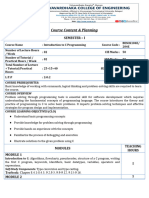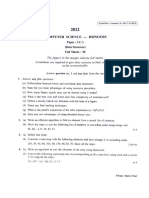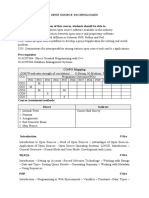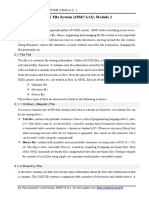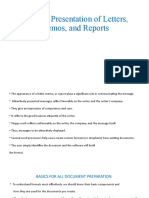Unix Lab Manual
Uploaded by
ashutoshsk512Unix Lab Manual
Uploaded by
ashutoshsk512Unix Programming Laboratory
1.a) Write a shell script that takes a valid directory name as an
argument and recursively discard all the subdirectories,find the
maximum length of any file in that hierarchy and write its maximum
value to the standard output.
clear
if [ $# -ne 1 ]
then
echo "invalid number of arguments passed"
exit
fi
if [ ! -d $1 ]
then
echo "directory not exits"
exit
fi
echo "recursive listing of the $1 directory is:"
ls -lR $1
echo "length of the file with maximum legnth:"
ls -lR $1| tr –s “ “|grep “^-“|cut –d “ “ –f5 | sort –n|tail -1
Dept of MCA, RNSIT
Unix Programming Laboratory
1.b) Write a shell script that accepts a pathname and creates all the
components in that pathname as directories. for example, if the script it
named mpc,then the command mpc a/b/c/d should create directories
a,a/b,a/b/c,a/b/c/d.
clear
if [ $# -ne 1 ]
then
echo "Invalid command line areguments"
exit
else
mkdir –pv $1
fi
Dept of MCA, RNSIT
Unix Programming Laboratory
2.a)Write a shell script that accepts two file names as arguments, check
if the permissions for these files are identical and if the permissions are
identical, output common permissions and otherwise output each file
names followed by its permissions.
clear
echo “program to print permissions of two files”
if [ $# -ne 2 ]
then
echo “invalid number of arguments passed”
exit
fi
if [ ! –e $1 ]
then
echo “first file not exists”
exit
fi
if [ ! –e $2 ]
then
echo “first file not exists”
exit
fi
P1=`ls –l $1|cut –c 2-10`
P2=`ls –l $2|cut –c 2-10`
if [ $P1 = $P2 ]
then
echo “both files have identical permissions”
echo “ $1 permissions are:$p1”
echo “$2 permissions are”$p2”
else
echo “both files have not identical permissions”
echo “ $1 permissions are:$p1”
echo “$2 permissions are”$p2”
fi
Dept of MCA, RNSIT
Unix Programming Laboratory
2.b)Write a shell script which accepts valid login names as arguments
and print their corresponding home directories. if no arguments are
specified, print a suitable error message.
clear
if [ $# -eq 0 ]
then
echo "No command line argument passed"
exit
fi
while [ $1 ]
do
cat /etc/passwd | cut -d ":" -f1 | grep "$1" > temp
ck=`cat temp`
if [ "$ck" != "$1" ]
then
echo "ERROR : $1 is an invalid Login name"
else
echo "Home Directory for $1 is:"
cat /etc/passwd | grep "$1" | cut -d ":" -f6
fi
shift
done
Dept of MCA, RNSIT
Unix Programming Laboratory
3.a) Create a script file called file properties that reads a filename
entered and out its properties.
clear
echo "enter the filename"
read fn
if [ -f $fn ]
then
ls -l $fn
else
echo "file not found"
fi
Dept of MCA, RNSIT
Unix Programming Laboratory
3.b)Write a shell script to implement terminal locking(similar to the
lock command).It should prompt the user for a ppassword.After
accepting the password enter by the user, it must be prompt again for
the matching password as conformation. And it the match occurs, it
must lock the keyword until a matching password is enter again by the
user. Note that the script must be written to disregard break, Ctrl-D.No
time limit need be implemented for the lock duration.
stty -echo
echo “Enter password”
read pass1
echo “Confirm password”
read pass2
if [ “$pass1” = “$pass2” ] ;
then
echo “Terminal is locked”
trap 1 2 15
while true
do
echo ” Enter password”
read pass3
if [ “$pass3” = “$pass2” ]
then
echo “Terminal Unlocked”
stty echo
exit
else
echo “Try again”
fi
done
else
echo “password do not match”
stty echo
fi
Dept of MCA, RNSIT
Unix Programming Laboratory
4.a) Write a shell script that accepts one or more file name as arguments
and convert all of them to uppercase provided they exists in current
directory.
if [ $# -eq 0 ]
then
echo "invalid number of arguments"
exit
fi
for fn in "$@"
do
if [ -f $fn ]
then
echo $fn | tr '[a-z]' '[A-Z]'
else
echo "File not found -$fn"
fi
done
Dept of MCA, RNSIT
Unix Programming Laboratory
4.b) Write a shell script that displays all the links to a file specified as
the first argument to the script. The second argument, which is optional,
can be used to specify in which the search is to begin. If the second
argument is not present, the search is to begin in current working
directory. In either case the starting directory as well as all its sub-
directories at all levels must be searched. The script need not include
any error checking.
clear
if [ "$2" != " " ]
then
cwd=`pwd`
cd $2
link=`ls -l $1 | tr -s " " | cut -d " " -f2`
cd $cwd
else
link=`ls -l $1 | tr -s " " | cut -d " " -f2`
fi
echo "number of links of file $1=$link"
Dept of MCA, RNSIT
Unix Programming Laboratory
5.a)Write a shell script that accepts as filename as argument and display
its creation time if the file exists and if it does not send output error
message.
if [ $# -ne 1 ]
then
echo "invalid no. of arguments"
exit
fi
if [ -e $1 ]
then
echo "file $1 is created on :`ls -l $1 | tr -s " "| cut -d " " -f 6,7,8`"
else
echo " file not found"
fi
Dept of MCA, RNSIT
Unix Programming Laboratory
5.b)Write a shell script to display the calendar for current month with
current date replaced by * or ** depending on whether the date has one
or two digit.
a=`date +%e`
if [ $a -lt 10 ]
then
cal | sed "s/$a/*/"
else
cal | sed "s/$a/**/"
fi
Dept of MCA, RNSIT
Unix Programming Laboratory
6.a)Write a shell script to find a file/s that matches a pattern given as
command line argument in the home directory, display the contents of
the file and copy the file into the directory ~/mydir.
clear
if [ $# -ne 1 ]
then
echo “invalid arguments”
exit
fi
dir=mydir
if [ -d $dir ]
then
echo “directory $dir exists”
else
mkdir $dir
fi
echo “the file matching the pattern $1 are”
ls *$1* >filenames.txt
cat filenames.txt
echo “the contents of the files are”
for i in `cat filenames.txt`
do
echo “filenames:$i”
cat $i
cp $i ./mydir/$i
done
echo “the files copied into ~/mydir”
cd mydir
ls -l
Dept of MCA, RNSIT
Unix Programming Laboratory
6.b)Write a shell script to list all the files in a directory whose file name
is atleast 10 characters(Use expr command to check the length).
clear
for I in `ls`
do
len=`expr “$i” : `.*``
if [ $len –ge 10 ]
then
echo $i >> outfile
fi
done
echo “filenames having more than 10 charaacters are”
cat outfile.
Dept of MCA, RNSIT
Unix Programming Laboratory
7.a)Write a shell script that get executed display the message either
“good morning” or “good afternoon” or “good evening” depending
upon time at which the user logs-in.
h=`who am i | tr -s " " | cut -d " " –f4 | cut -d ":" -f1`
if [ $h -lt 12 ]
then
echo "good morning"
else if [ $h -ge 12 -a $h -lt 17 ]
then
echo "good afternoon"
else
echo "good evening"
fi
fi
Dept of MCA, RNSIT
Unix Programming Laboratory
7.b)Write a shell script that accept a list of filenames as its
arguments,count and report occurance of each word that is present in
the first argument file on other argument files.
if [ $# -ne 2 ]
then
echo "Invalid number of arguments"
exit
fi
str=`cat $1`
for a in $str
do
echo "word=$a, count=`grep -c "$a" $2`"
done
Dept of MCA, RNSIT
Unix Programming Laboratory
8.a) Write a shell script that determine the period for which a specified
user is working on system and display appropriate message.
clear
echo "enter the username"
read usr
tm=`who | grep "$usr" | tr -s " " | head -1 | cut -d " " –f4`
uhr=`echo $tm | cut -d ":" -f1`
umin=`echo $tm | cut -d ":" -f2`
shr=`date "+%H"`
smin=`date "+%M"`
h=`expr $shr - $uhr`
m=`expr $smin - $umin`
if [ $m -lt 0 ]
then
m=`expr 60 + $m`
h=`expr $h - 1`
fi
echo "Username:$usr"
echo "LoginPeriod:$h:$m"
Dept of MCA, RNSIT
Unix Programming Laboratory
8. b)Write a shell script that reports the login in of a specified user with
one minute after he/she log in. The script automatically terminate if
specified user does not log in during a specified period of time.
clear
echo "Enter the login name of the user:"
read user
tm=0
while [ true ]
do
var=`who | grep "$user" | cut -d " " -f1`
if [ "$var" = "$user" ]
then
echo "$user logged in"
exit
else
sleep 1
tm=`expr $tm + 1`
fi
if [ $tm -eq 61 ]
then
echo "$user did not login within 1 minute"
exit
fi
done
Dept of MCA, RNSIT
Unix Programming Laboratory
9.a) Write a shell script that accept the file name, starting and ending
line number as an argument and display all the lines between the given
line number.
if [ $# -ne 3 ]
then
echo "invalid number of arguments"
exit
fi
if [ $2 -gt $3 ]
then
echo "invalid range value"
exit
fi
la=`expr $3 - $2 + 1`
cat $1|tail +$2|head -$la
Dept of MCA, RNSIT
Unix Programming Laboratory
9.b)Write a shell script that folds long lines into 40 columns. Thus any
line that exceeds 40 characters must be broken after 40th, a “\” is to be
appended as the indication of folding and the processing is to be
continued with the residue. The input is to be supplied through a text
file created by the user.
clear
echo "enter the filename"
read fn
while read ln
do
lgth=`echo $ln | wc -c`
s=1
e=40
if [ $lgth -gt 40 ]
then
while [ $lgth -gt 40 ]
do
echo "`echo $ln | cut -c $s-$e`\\"
s=`expr $e + 1`
e=`expr $e + 40`
lgth=`expr $lgth - 40`
done
echo $ln | cut -c $s-
else
echo $ln
fi
done < $fn
Dept of MCA, RNSIT
Unix Programming Laboratory
10.a) Write an awk script that accepts date argument in the form of dd-
mm-yy and displays it in the form if month,day,year.The script should
check the validity of the argument and in the case of error,display a
suitable message.
clear
BEGIN { printf "date validation" }
{
if (($2==2 && $1>29)||($1>31)||($2==4 || $2==6 || $2==9 || $2==11 &&
$1>30) ||($3%4!=0 && $1==2 && $2>28))
printf ("invalid date")
else
printf ("\n %d:%d:%d\n",$2,$1,$3)
}
end { "date conversion" }
Dept of MCA, RNSIT
Unix Programming Laboratory
10.b)Write an awk script to delete duplicated line from a text file.The
order of the original lines must be remain unchanged.
clear
BEGIN { print "script to delete duplicate line:" }
{ a[n++]=$0 }
END {
for(i=0;i<n;i++)
{
flag=0
for(j=0;j<i;j++)
{
if(a[i]==a[j])
{
flag=1
break
}
}
if(flag==0)
printf("%s\n",a[i])
}
}
Dept of MCA, RNSIT
Unix Programming Laboratory
11.a)Write an awk script to find out total number of books sold in each
discipline as well as total book sold using associate array down table as
given below.
Electrical 34
Mechanical 67
Electrical 80
Computer science 43
Mechanical 65
Civil 98
Computer science 64
BEGIN { print "total number of books sold in each category"}
{ books[$1]+=$2 }
END {
for(item in books)
{
printf("\t%-17s%1s%-5d\n",item,"=",books[item])
total+=books[item]
}
printf("%-17s%1s%-5d\n","total books sold","=",total)
}
Dept of MCA, RNSIT
Unix Programming Laboratory
11.b)Write an awk script to compute gross salary of an employee
accordingly to rule given below
If basic salary is<10000 then HRA=15% of basic & DA=45% of basic
If basic salary is>=10000 then HRA=15% of basic & DA=45% of basic
BEGIN { printf "enter the basic pay:"
getline bp <"/dev/tty"
if(bp<10000)
{
hra=.15*bp
da=.45*bp
}
else
{
hra=.2*bp
da=.5*bp
}
gs=bp+hra+da
printf "gross salary=%.2f\n",gs
}
Dept of MCA, RNSIT
You might also like
- Cs2253 - Computer Architecture 16 Marks Question Bank With Hints Unit - I 1. Explain Basic Functional Units of Computer. Input UnitNo ratings yetCs2253 - Computer Architecture 16 Marks Question Bank With Hints Unit - I 1. Explain Basic Functional Units of Computer. Input Unit18 pages
- CS2302 Computer Networks Anna University Engineering Question Bank 4 UNo ratings yetCS2302 Computer Networks Anna University Engineering Question Bank 4 U48 pages
- Unit 4 - Software Engineering - WWW - Rgpvnotes.inNo ratings yetUnit 4 - Software Engineering - WWW - Rgpvnotes.in12 pages
- LAB MANUAL - OS - 2021 Regulation Final-1No ratings yetLAB MANUAL - OS - 2021 Regulation Final-168 pages
- Cse-IV-unix and Shell Programming (10cs44) - Notes100% (1)Cse-IV-unix and Shell Programming (10cs44) - Notes163 pages
- Experiment:1: Write A Shell Script To Generate A Multiplication Table100% (1)Experiment:1: Write A Shell Script To Generate A Multiplication Table48 pages
- Algorithm For Asynchronous Check Pointing and RecoveryNo ratings yetAlgorithm For Asynchronous Check Pointing and Recovery4 pages
- PPT-Unit-4 CPU Scheduling and AlgorithmsNo ratings yetPPT-Unit-4 CPU Scheduling and Algorithms56 pages
- AKTU - QP20E290QP: Time: 3 Hours Total Marks: 100100% (1)AKTU - QP20E290QP: Time: 3 Hours Total Marks: 1002 pages
- Problem Solving and Python Programming - GE3151 - Important Questions With 2 Marks Answer - Unit 2 - Data Types Expressions StatementsNo ratings yetProblem Solving and Python Programming - GE3151 - Important Questions With 2 Marks Answer - Unit 2 - Data Types Expressions Statements30 pages
- CU-2022 B.Sc. (Honours) Computer Science Semester-2 Paper-CC-3 QPNo ratings yetCU-2022 B.Sc. (Honours) Computer Science Semester-2 Paper-CC-3 QP2 pages
- Jerusalem College of Engineering: ACADEMIC YEAR 2021 - 2022No ratings yetJerusalem College of Engineering: ACADEMIC YEAR 2021 - 202240 pages
- BCS358D Data Visualization With Python SyallabusNo ratings yetBCS358D Data Visualization With Python Syallabus4 pages
- (Chapter 1 Introduction) : The Evolving Role of SoftwareNo ratings yet(Chapter 1 Introduction) : The Evolving Role of Software16 pages
- Daa-r22-Unit 1&2-Digital Notes Cse Dept (A.y 2024-25) @DR.KNo ratings yetDaa-r22-Unit 1&2-Digital Notes Cse Dept (A.y 2024-25) @DR.K50 pages
- Cs3501 Compiler Design Laboratory 2021r - Lab ManualNo ratings yetCs3501 Compiler Design Laboratory 2021r - Lab Manual55 pages
- CS2354 Advanced Computer Architecture Anna University Question Paper For MENo ratings yetCS2354 Advanced Computer Architecture Anna University Question Paper For ME2 pages
- Aashima Aaashima - Be19@thapar - Edu: Quiz II - UCS415No ratings yetAashima Aaashima - Be19@thapar - Edu: Quiz II - UCS4158 pages
- Module 4. Awk and Advanced Shell ProgrammingNo ratings yetModule 4. Awk and Advanced Shell Programming25 pages
- Module 2 - Physical Presentation of Reports Letters0% (1)Module 2 - Physical Presentation of Reports Letters14 pages
- Module 2 - Physical Presentation of Reports Letters0% (1)Module 2 - Physical Presentation of Reports Letters14 pages
- CIS CS126 Introduction To Information & Communication Technologies AsharAli CS secABCDE 2022FNo ratings yetCIS CS126 Introduction To Information & Communication Technologies AsharAli CS secABCDE 2022F4 pages
- Mini Project Phase 1 Seminar PPT TemplateNo ratings yetMini Project Phase 1 Seminar PPT Template13 pages
- Code No: A27AF R15: Scheme of EvaluationNo ratings yetCode No: A27AF R15: Scheme of Evaluation2 pages
- Ac Motor Speed Control Using PWM Technique100% (1)Ac Motor Speed Control Using PWM Technique63 pages
- DS1302 RTC Module Features For Accurate TimekeepingNo ratings yetDS1302 RTC Module Features For Accurate Timekeeping8 pages
- Wang2021 Article Z-domainModelingOfPeakCurrentMNo ratings yetWang2021 Article Z-domainModelingOfPeakCurrentM11 pages
- Hydraulic Valve For The Control of Hazardous MovementsNo ratings yetHydraulic Valve For The Control of Hazardous Movements3 pages
- Signal Line 256 Gray Level 3 Channel Constant Current LED Driver ICNo ratings yetSignal Line 256 Gray Level 3 Channel Constant Current LED Driver IC8 pages
- Measurements On The Properties of Microwave Integrated CircuitsNo ratings yetMeasurements On The Properties of Microwave Integrated Circuits7 pages
- 3BSE020926-510 en S800 I O Fieldbus Communication Interface For PROFIBUS DP DPV1No ratings yet3BSE020926-510 en S800 I O Fieldbus Communication Interface For PROFIBUS DP DPV1120 pages
- Cs2253 - Computer Architecture 16 Marks Question Bank With Hints Unit - I 1. Explain Basic Functional Units of Computer. Input UnitCs2253 - Computer Architecture 16 Marks Question Bank With Hints Unit - I 1. Explain Basic Functional Units of Computer. Input Unit
- CS2302 Computer Networks Anna University Engineering Question Bank 4 UCS2302 Computer Networks Anna University Engineering Question Bank 4 U
- Unit 4 - Software Engineering - WWW - Rgpvnotes.inUnit 4 - Software Engineering - WWW - Rgpvnotes.in
- Cse-IV-unix and Shell Programming (10cs44) - NotesCse-IV-unix and Shell Programming (10cs44) - Notes
- Experiment:1: Write A Shell Script To Generate A Multiplication TableExperiment:1: Write A Shell Script To Generate A Multiplication Table
- Algorithm For Asynchronous Check Pointing and RecoveryAlgorithm For Asynchronous Check Pointing and Recovery
- Problem Solving and Python Programming - GE3151 - Important Questions With 2 Marks Answer - Unit 2 - Data Types Expressions StatementsProblem Solving and Python Programming - GE3151 - Important Questions With 2 Marks Answer - Unit 2 - Data Types Expressions Statements
- CU-2022 B.Sc. (Honours) Computer Science Semester-2 Paper-CC-3 QPCU-2022 B.Sc. (Honours) Computer Science Semester-2 Paper-CC-3 QP
- Jerusalem College of Engineering: ACADEMIC YEAR 2021 - 2022Jerusalem College of Engineering: ACADEMIC YEAR 2021 - 2022
- (Chapter 1 Introduction) : The Evolving Role of Software(Chapter 1 Introduction) : The Evolving Role of Software
- Daa-r22-Unit 1&2-Digital Notes Cse Dept (A.y 2024-25) @DR.KDaa-r22-Unit 1&2-Digital Notes Cse Dept (A.y 2024-25) @DR.K
- Cs3501 Compiler Design Laboratory 2021r - Lab ManualCs3501 Compiler Design Laboratory 2021r - Lab Manual
- CS2354 Advanced Computer Architecture Anna University Question Paper For MECS2354 Advanced Computer Architecture Anna University Question Paper For ME
- Aashima Aaashima - Be19@thapar - Edu: Quiz II - UCS415Aashima Aaashima - Be19@thapar - Edu: Quiz II - UCS415
- Module 2 - Physical Presentation of Reports LettersModule 2 - Physical Presentation of Reports Letters
- Module 2 - Physical Presentation of Reports LettersModule 2 - Physical Presentation of Reports Letters
- CIS CS126 Introduction To Information & Communication Technologies AsharAli CS secABCDE 2022FCIS CS126 Introduction To Information & Communication Technologies AsharAli CS secABCDE 2022F
- DS1302 RTC Module Features For Accurate TimekeepingDS1302 RTC Module Features For Accurate Timekeeping
- Hydraulic Valve For The Control of Hazardous MovementsHydraulic Valve For The Control of Hazardous Movements
- Signal Line 256 Gray Level 3 Channel Constant Current LED Driver ICSignal Line 256 Gray Level 3 Channel Constant Current LED Driver IC
- Measurements On The Properties of Microwave Integrated CircuitsMeasurements On The Properties of Microwave Integrated Circuits
- 3BSE020926-510 en S800 I O Fieldbus Communication Interface For PROFIBUS DP DPV13BSE020926-510 en S800 I O Fieldbus Communication Interface For PROFIBUS DP DPV1

















